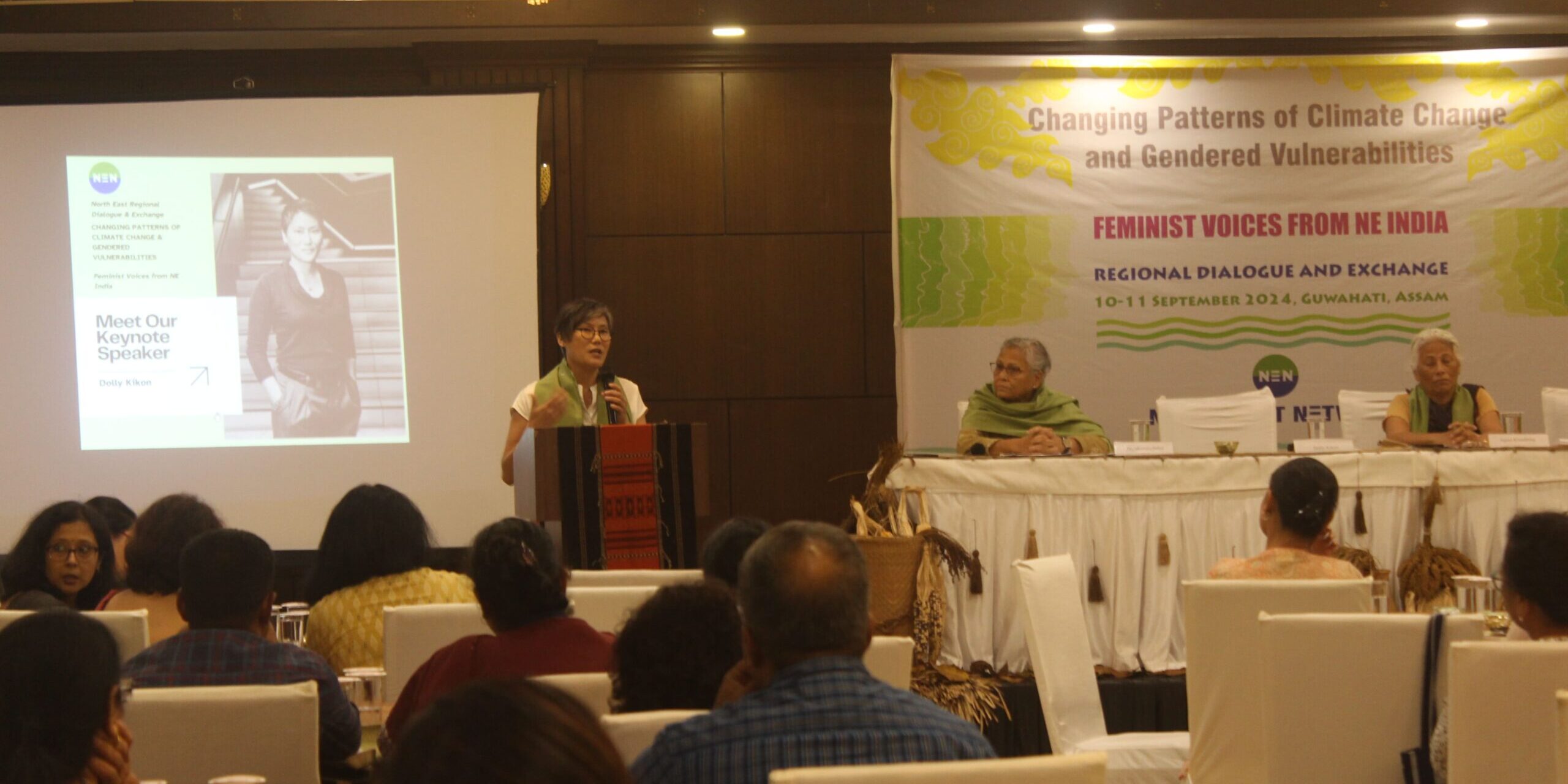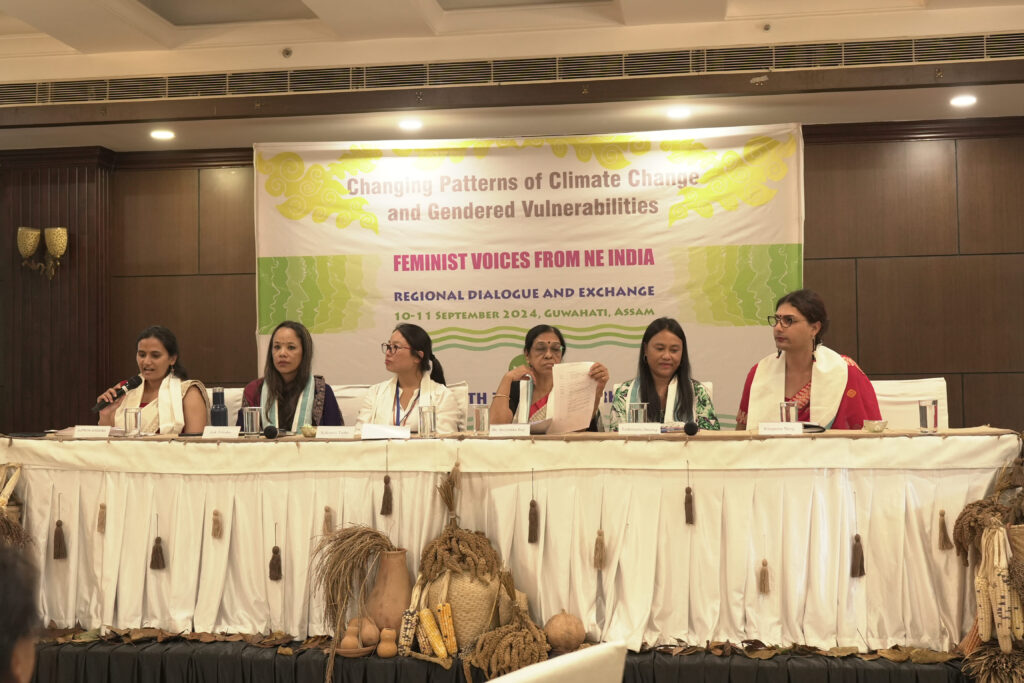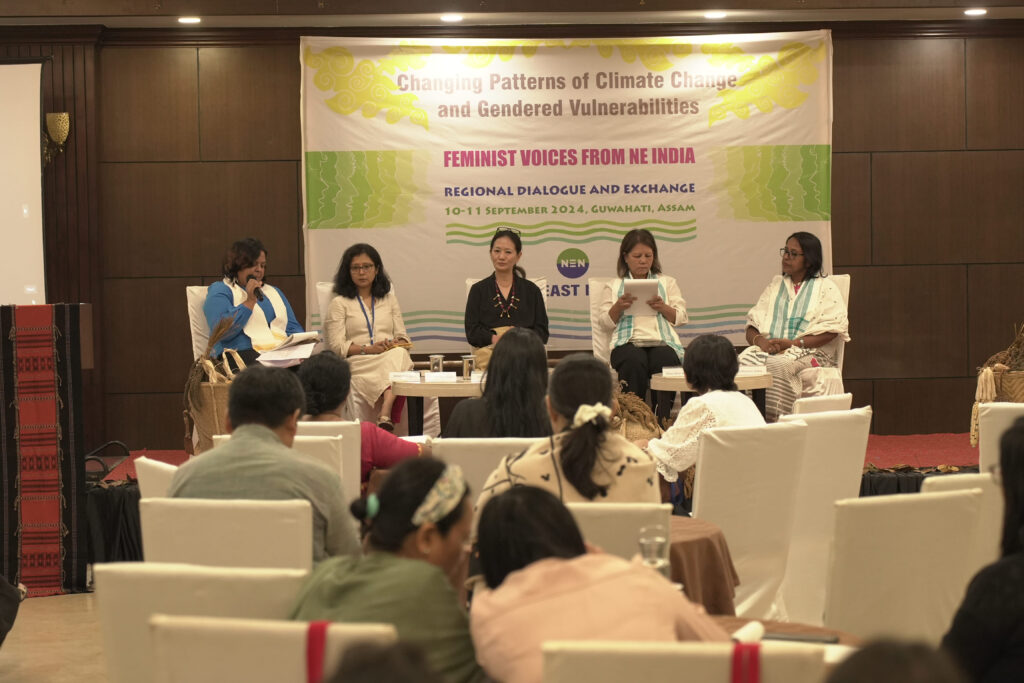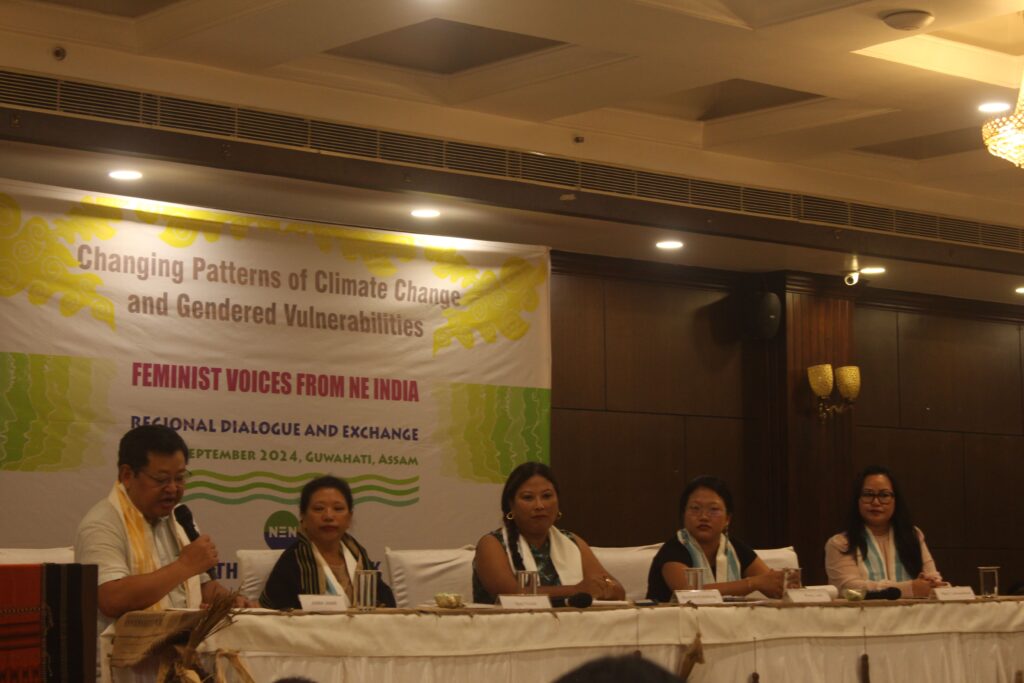North East Network organised a Regional Dialogue and Exchange on Changing Patterns of Climate Change and Gendered Vulnerabilities: Feminist Voices from North-east India. It was held between 10-11 September 2024, in Guwahati. The Dialogue saw an attendance of over 100 participants from all 7 states of NE India including Sikkim. Practitioners, grassroots women’s groups, activists, advocates, scientists, researchers and academics, media, women’s organisations, youth groups were amongst the participants. The keynote speakers were Dolly Kikon, Professor of Department of Anthropology and Director of Center for South Asian Studies at the University of California, Santa Cruz and, Agnes Khashiing, Human Rights Defender and Social Worker, Meghalaya.
Dolly Kikon highlighted the urgent need to reexamine the concept of “liveability” in the context of climate change in NE India, and posed critical questions about what liveability entails, such as housing, transportation, safety, and recreation. In the context of development-induced displacement, out-migration, and conflicts over land and resources, Kikon emphasised the importance of prioritising community engagement, care, and service. She also underscored that, as feminists, we must focus our work on healing and justice, and this means to re-humanize ourselves and extend beyond the human world – land, animals, birds, plants.
Agnes Kharshiing highlighted the connection between corruption and food insecurity amidst climate change challenges, emphasising that this poses a significant threat to women, who are primarily responsible for providing food and care at the household level. She identified corruption and greed as root causes of the numerous social, political, and environmental injustices affecting NE India. Kharshiing stressed that addressing systemic and structural violence against the poor and marginalised requires us to speak out, empower communities to raise their collective voice, foster networking and mutual support, and most importantly “humaneness”.
Panellists included Amba Jamir, Policy and Development Strategist, Nagaland, Seno Tsuhah, General Body Member of NEN and Trustee of Nenterprise, Nagaland, Mayfereen Ryntathiang, Founder and President of Grassroots NGO, Meghalaya, Bhanu Tatak, Independent Researcher and Co-founder of Dibang Resistance and Legal Advisor of Siang Indigenous Farmers Forum, Arunachal Pradesh, Supriya Khound, Sustainable Development Specialist, Assam, Wekoweu Tsuha, State Coordinator of NEN, Nagaland, Dr Sreelekha Ray, President of Voluntary Health Association, Tripura, Lak Tsheden, Landscape Coordinator, Khangchendzonga Landscape, WWF-India, Sikkim, Rituparna Neog, Director of Akam Foundation, Assam, Bondita Mrina, Director, Purva Bharati Educational Trust, Assam, Nilanju Dutta, Gender and Biodiversity Lead, NEN, Assam, Azungla James, Director of Sisterhood Network, Nagaland and Mary Beth Senate, Chief Functionary, Rural Women Upliftment Society, Churachandpur, Manipur, Mimi T Lalhmachhuani, General Secretary of the All Mizoram Women Federation, Mizoram, Tsuktirenla Imsong, Street Vendor, New Market, Dimapur, Nagaland and Jollymoni Saikia, Gender Specialist, North East Affected Area Development Society (NEADS), Jorhat, Assam. The discussions critically looked at women’s livelihoods, food insecurity, government schemes, health, issues of safety, peace-building efforts, intersecting vulnerabilities and more.
The Dialogue deliberated on 3 key issues from a feminist viewpoint which included the following-
- Climate Change, Biodiversity and Governance: Understanding the Intersections and Gendered Impacts
- Climate change and livelihoods: Gender inequality experiences and adaptation strategies
- Climate change, gender-based violence and peace building: Experiences from the ground and women’s resilient voices
At the end of the two-day dialogue, the participants came up with critical observations and recommendations regarding the situation of women in the context of NE India (NEI) and climate change.
It was recognised that the impact of climate change is not gender-neutral. “This Dialogue shall locate the position, role and contribution of women of all identities in the discussions on climate justice which are overwhelmingly patriarchal with very marginal representation of women leaders at the great global dialogues and debates”, emphasised Anurita Pathak Hazarika, Executive Director (I/C) of NEN.
Women and girls in the NEI bear the brunt of climate change, which exacerbates existing gender inequalities and presents unique threats. These risks are particularly acute for women who are migrants, single, disabled, transgender, older persons, vendors, those from diverse ethnic backgrounds, and residents of remote/rural areas or conflict and disaster-prone areas. The effects of climate change are compounded by existing gender inequalities in both patrilineal and matrilineal communities of NEI, posing challenges to the rights of women and sustainable development. With women being disproportionately affected by climate change, it is critical to see how climate change intersects with gender inequalities.
With changing climate patterns, women face reduced incomes, loss of livelihood and food insecurity. Lack of women’s participation in governance and inheritance rights over land negatively impacts women’s ability to adapt to climate change. Further, women shoulder most of the household chores and caregiving responsibilities.
During climate-related calamities, including food scarcity or health crises, the workload for women and girls multiplies significantly. Crucially, climate change increases their vulnerability to all forms of gender-based violence (GBV), including domestic violence, sexual abuse, trafficking, and child/early marriage. Moreover, the region is prone to ethnic conflicts, which has led to the loss of livelihoods and natural resources, migration, displacement and GBV, among others, which have adversely affected women’s ongoing peace-building efforts at the grassroots level.
Some recommendations focused on reviewing women’s inheritance rights over land and common resources, ensuring equal wages across different government programmes. It is crucial to recognise women as farmers, as knowledge holders and key actors in building climate resilience. Support and acknowledgement must be given to women-led initiatives including conservation of traditional seeds, agroecological practices and innovations, livelihood diversification, and environmental action.
In the name of mega development projects, women have faced displacement and unfair resettlement packages which undermine their rights as equal citizens. The need to protect and defend the commons to secure women’s rights was emphasised, as these commons are critical for sustaining their lives and livelihoods.
In areas of conflict, the situation is aggravated by both natural and human-made disasters: the women-led markets and intercommunity movements have been affected. Such chains must be restored in order to restore social fabric for sustainable peace.
It was strongly felt that gender segregated data is currently lacking in the context of NEI. The group suggested that documentation, mapping community resources and research, and allocating funds and resources are crucial for understanding the gendered impacts of climate disasters. The need for convergence and collaborative engagements of diverse stakeholders was highlighted.
Realising the importance of intersections between GBV and climate change, it is extremely important to identify different patterns of unsafe movements, migration, displacement and thus, prevent GBV. Equally important is understanding the newer forms of GBV which women face in homes and markets caused by decreased incomes and basic essentials, increased loans liabilities from microfinance institutions, etc and which have linkages due to adverse effects of climate change. During climate-induced disasters, gender responsive services must be available. Traffickers and middle persons lure women in relief camps and make them vulnerable to abuse. These are alarming concerns. Girls are unsafe and married off early and therefore especially when a place is affected by climate disasters these issues have to be viewed from a climate induced impact lens. It must be a top priority to include women in all kinds of disaster management committees pre and post such disasters and the policies must be gender responsive and gender inclusive.
“No agenda is complete or inclusive if a feminist agenda is lacking”, said Anurita. Therefore, the voices of women viewed through an intersectional lens must be included in community interventions, grassroots governance, state and national climate action plans and global policy frameworks at all strategic levels. Such plans must be intentional, deep rooted and see an uncompromising engagement with the women’s movement in the country.










